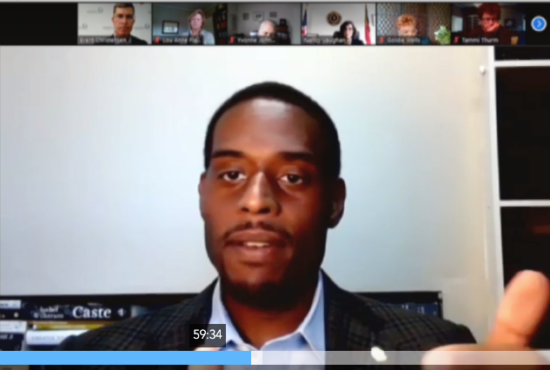The City Council was all set to approve a new economic incentive policy at the Tuesday, Feb. 16 meeting, but instead it decided to discuss additional requirements that not all councilmembers support.
The council plans to hold a work session to discuss adding a requirement for businesses that choose to locate in an Economic Impact Zone. The addition would require those businesses to hire a percentage of their workforce from the Economic Impact Zones.
Councilmember Justin Outling said such an additional requirement might be counterproductive.
At the Tuesday, Feb. 16 meeting, Councilmember Sharon Hightower said that she wanted a requirement that businesses that received economic incentives to locate in the Economic Impact Zones be required to hire 10 percent of their workforce from the two Economic Impact Zones, which roughly correspond to East Greensboro.
Mayor Nancy Vaughan supported the idea and said, “Maybe 10 percent isn’t high enough.”
Outling said that he agreed with the goal of bringing more jobs to areas of high economic distress, but he said, “Ultimately, what it comes down to is if actually having a requirement is counterproductive.”
He said, “We need to look at other cities and compare what we are offering to what they are offering. Here we have strings attached. If there are no strings elsewhere, we could lose out on the business.”
He noted that Greensboro was struggling to attract new jobs while “the larger cities in the state are in a position where they can turn down jobs.”
And he questioned whether it would be wise for Greensboro to turn down jobs because a company didn’t want to have to comply with the additional requirements.
Outling said that as far as the Minority and Women’s Business Enterprise (MWBE) requirements in the policy, those already existed but were not being monitored and enforced. He said that if MWBE requirements are important enough to include in the agreements, then they are important enough for the City Council to have a policy and an enforcement mechanism.
Outling differentiated between the Economic Development Incentive Policy as it was written, which standardizes, regulates and enforces requirements that were already being placed in the contracts, and the idea of requiring 10 percent of the workforce to be hired from a particular area, which is something the City Council has not required in previous contracts.
The Economic Development Incentive Policy that was on the agenda was the result of three work sessions the City Council held in October and November last year.


Here is an idea council- how about hire those that are qualified, good work ethic, history of a good employee regardless of race. The reason you Mayor and Council cannot attract business is due to your lack of vision due to your color blindness.
What if the workforce needed by a company is not present in the economic zone? Are you going to turn down a business that wants to try and locate in these areas? Don’t make the requirements so difficult that you make locating in these area impossible for the business.
This guy is really working for my vote. I’m a staunch conservative, but he’s doing all the right things in the face of this out-of-control council.
Shame more people on the left and right can’t follow his example. Facts over feelings. Common sense and reality over Fantasy Island.
I’m sure the cabal will find a way to silence him, or they’ll just start calling him names and pull out their Gender card since the race one won’t work.
Justin Outling for Mayor, bringing common sense back to Greensboro!
Yes ! Go Justin !
Absolutely! Am a conservative and will vote for Justin if there’s not a more qualified conservative running.